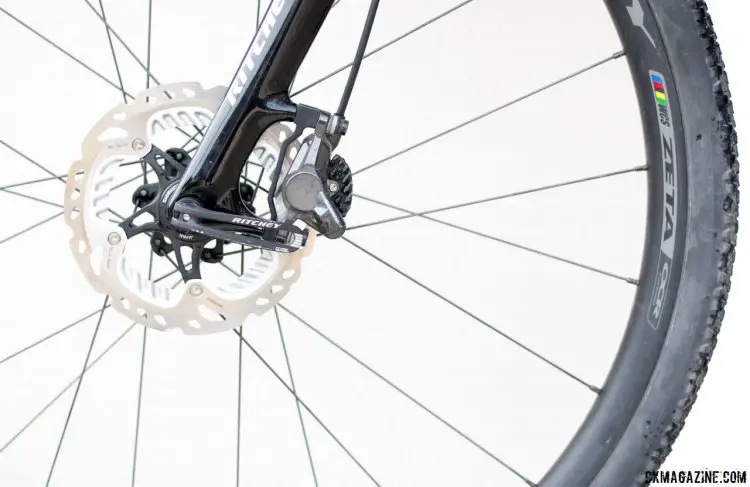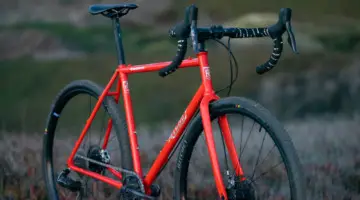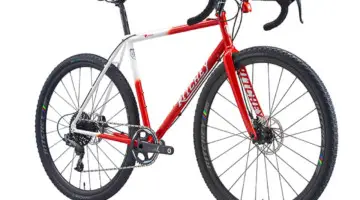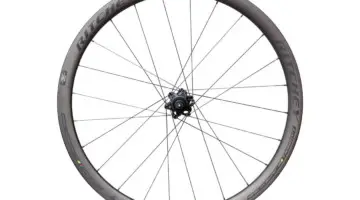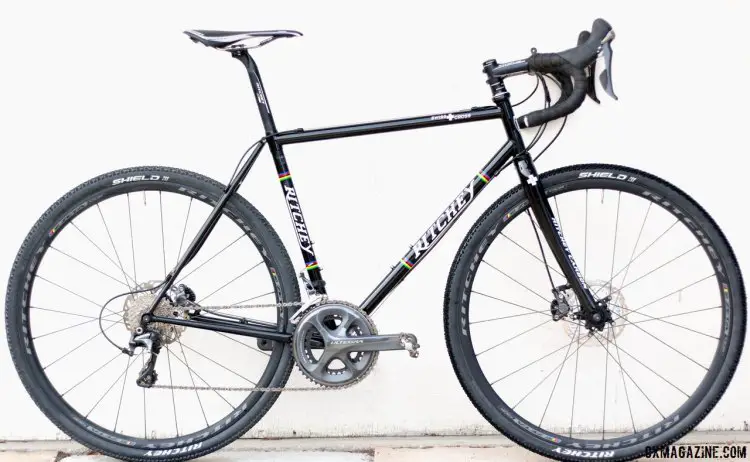
The Ritchey Swiss Cross has classic lines with the simple, thin tubes that only steel can provide. © Cyclocross Magazine
When it comes to steel cyclocross frames, Tom Ritchey and his company Ritchey Design have been in the game longer than most. As such, his creations appeal to a wide variety of riders including "old-timers" who want a bike that harkens back to the origins of the sport. At the same time, Ritchey has managed to create a reputation for performance that will appeal to the more aggressive riders and racers.
The Swiss Cross cyclocross bike is named after Thomas Frischknecht, known as the European Elder Statesman of mountain biking for his long and celebrated career. However, Frischknecht also had an impressive cyclocross career, winning the Junior World Championship in 1988, the Amateur title in 1991, and finishing second in the Elite race in 1997 behind Daniele Pontoni. Even though he currently works with the Scott-ODLO Racing Team, "Frishi" still remains close friends with Tom Ritchey, and at Sea Otter just two years ago, the two were having a blast together at the Scott Addict CX launch.
We had a chance to give the Swiss Cross Disc a test, our second Swiss Cross after reviewing the cantilever version way back in Issue 15.
Ritchey Swiss Cross Disc: The Frame
The Swiss Cross Disc, is by our count, the third iteration of the Swiss Cross. Ritchey offered a Swiss Cross in the late 90s, brought it back in its traditional red in 2011 as a cantilever bike, and then displayed a disc version at NAHBS in 2014.
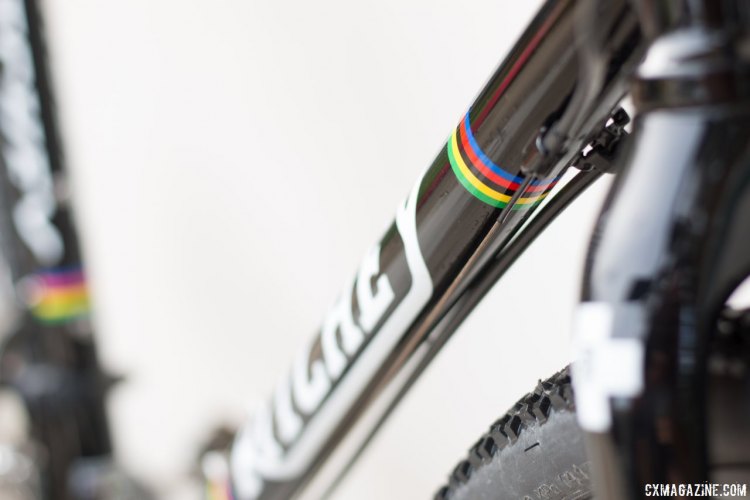
The Ritchey Swiss Cross uses full length housing stops for use with cable or hydraulic brakes. © Cyclocross Magazine
The Swiss Cross frame uses Ritchey's WCS Logic Tubing that is triple-butted and heat treated. On our 55cm test bike, the frame claimed frame weight is 4.19 lbs. which isn't super light compared to other frame materials out there, but for a steel bike with disc brake mounts, it is reasonably svelte.
The Swiss Cross has a 72 degree head tube angle and a 73.5 degree seat tube angle. The 63mm of bottom bracket drop provides more clearance for rooty, gnarly trail conditions. It's a tad high given in today's world, but with its Swiss Cross name, it's appropriately "Euro" and lets you pedal a bit more in the off-camber sections.
The integrated seat clamp is also a signature Ritchey design and keeps the bike's lines clean and simple. No rack or fender mounts here—as the Swiss Cross keeps its performance oriented target in sight.
It's a cyclocross race-oriented bike in terms of build and tire clearance, in an era of trendy, do-it-all bikes. Could it be a dying breed? Ritchey has shown a yet-to-be-released Outback model which may appeal to American tastes, with bigger tire clearance and fittings for hauling gear, but the company says it has plenty of stock of this model and certainly intends to keep offering it in Europe.
Ritchey Swiss Cross Disc: The Build
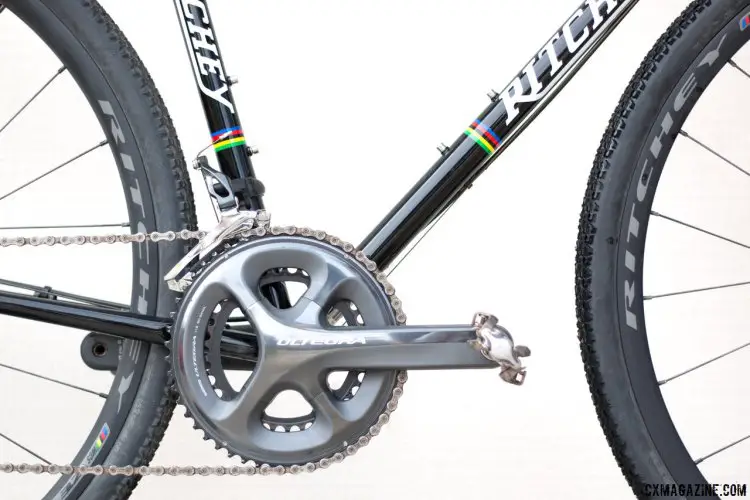
Shimano Ultegra compact cranks provide more climbing prowess to this steel rig. Ritchey Swiss Cross steel cyclocross bike. © Cyclocross Magazine
With the exception of the chainring choice, the Swiss Cross is ready for cyclocross racing.
The Shimano RS 785 hydraulic disc brakes are the true highlight of this bike's spec, offering great stopping power. The Swiss Cross is fitted with 160mm rotors front and rear.
The Ritchey Shield Comp tires in 700x35c size provide plenty of volume—we've said repeatedly that bigger volume clinchers like the Shield are key to narrowing the gap to tubular rolling resistance. The tread of the Shields also strike a good balance between dirt and gravel traction conditions.
The double compact drivetrain might be an odd choice for this bike but it broadens the appeal of the Swiss Cross, considering that potential buyers of this bike could be coming from very different backgrounds with different types of usage in mind, and the 50/34 offers gearing for the road, gravel and mixed terrain. For just cyclocross racing, we'd prefer a tighter combination of 36/46. If the simplicity of a 1x setup appeals to you, the Swiss Cross can certainly be fitted with one.
One of the standout components that we really like so far is the Ritchey WCS Evocurve Blatte handlebar. The bar has a short reach with a shallow drop that provides a comfortable yet secure feeling at any position.
We have two nitipicks beyond the choice of chainrings. We always want internal cam quick releases, and have experience some angle slip with the saddle clamp design after some less-than-smooth remounts. Two bolts, front and back, is always the safer way to go. Sound familiar?
Ritchey Swiss Cross Disc: Ride Impressions
Steel, quick releases, narrow tubes, and a slightly higher bottom bracket either may sound like a retro, outdated ride or a classy, tried-and-true race-oriented cyclocross bike. Regardless of your school of thought, we will say it's a refreshing combination that reveals its value in ride quality.
Nearly every aspect of the Ritchey Swiss Cross is not optimized for maximum stiffness. From the diameter of the tubing to the design of the fork, the Swiss Cross is not the type of bike that will beat you to death on washboard dirt roads or bulletproof early season dirt cyclocross courses. Quick release axles, high volume cyclocross tires, and even the "Vector Wing" Streem saddle all offer a bit of flex or give, whether intentional or not, to take the edge off bumpy terrain.
Ritchey forks have always been one of the more comfortable options on the market, and with cantilever brakes, were one of the more shudder-prone options. However, the disc version avoids such brake shudder and still offers more compliance than most modern disc forks.
You can fit a pair of the 38c Ritchey Megabite tires, one of our favorite all-around tubeless tires, in the frame, but there isn't much room up front or out back to squeeze in a 40c gravel knobby. The Swiss Cross is not called the Swiss Gravel, and it's a cyclocross bike, yet despite the limited tire clearance for the current crop of 40c rubber, due to its forgiving ride, it's one of our favorite gravel bikes for longer dirt road and mixed terrain adventures.
In terms of handling, the Swiss Cross feels relatively nimble and quick steering. Our test bike offered up a 72 degree head angle, 42.5cm chainstays, and paired with the 63mm drop, it's the type of bike that feels at home navigating chicanes with confidence, without much worry of pedal strike or overshooting the corners. Although a bit high off the ground, with a pair of slicks, it's also quite at home on the road, and could easily be your road bike and help you reenact Frischknecht racing the 1996 Olympic Games Road Race on his Ritchey cyclocross bike.
If you're annoyed by a bit of flex, an extra pound or two and subscribe to the stiffer-is-better philosophy, the Ritchey Swiss Cross bike isn't designed for you. It's not a sprinter's bike or a crit bike, but a bike that is equally at home on long mixed terrain rides or on a cyclocross course for an hour or so of pain.
Bikes like the Swiss Cross Disc may be falling out of favor due to the current trend towards metal adventure bikes, but if ride quality, not bikepacking gear or dropper posts is your priority, the Swiss Cross Disc should have you cycling with a smile for decades to come. Classics outlast trends, and the Swiss Cross is at the head of its class.
Ritchey Swiss Cross Disc Specs:
MSRP: $2999 as tested complete ($1099.95 frameset)
Frame: Ritchey Swiss Cross Disc
Fork: Ritchey Cross WCS Carbon
Headset: Ritchey WCS Drop In 1-1/8"
Rear Derailleur: Shimano Ultegra 11s
Front Derailleur: Shimano Ultegra 2s
Shifters: Shimano RS685 Hydraulic Disc
Brakes: Shimano RS785 Hydraulic Disc
Rotors: Shimano RT99-S 160mm
Crankset: Shimano Ultegra 50/34 – 170mm (49/51cm),172.5mm (53/55cm), 175mm (57/59cm)
BB-Set: Shimano Ultegra BBR60 (BSA)
Handlebar: Ritchey EvoMax WCS Blatte – 42cm (49/51cm), 44cm (53/55cm), 46cm (57/59cm)
Bar Tape: Ritchey Cork Black
Stem: Ritchey C-220 WCS Blatte – 80mm (49/51cm), 90mm (53cm), 100mm (55cm), 110mm (57/59cm)
Seatpost: Ritchey Link WCS 350x27.2mm Blatte
Saddle: Ritchey Streem WCS Black
Wheelset: Ritchey Zeta Disc WCS
Chain: Shimano Ultegra HG700 11s
Cassette: Shimano CS-5800 11s 11/28T
Tires: Ritchey Shield 700x35 Comp foldable
Color: Black
Warranty:limited 5 years on frame, limited 1 year on paint to original owner
Weight: 20.93 pounds, 13.14 pounds without wheels
More info: ritcheylogic.com













